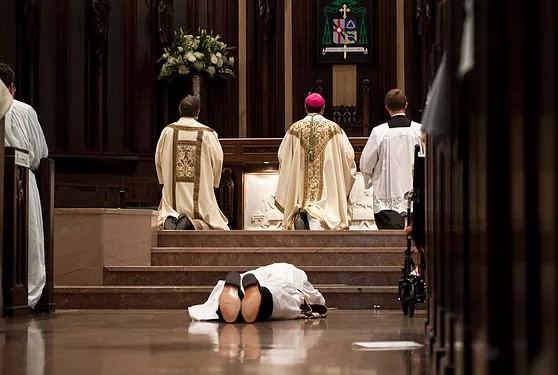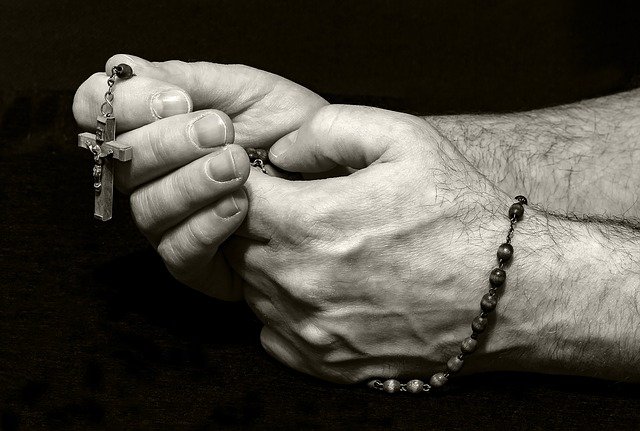frequently asked questions
“If we really understood the Mass, we would die of joy.” ~ St. John Vianney, Patron Saint of Priests

becoming a priest
Why did you become a priest?
We become priests because we discern a personal call from God. That does not mean we had an experience with thunderbolts and voices form heaven. Instead, we had an inner feeling that is almost unexplainable. As we grow to know ourselves beer, recognizing our talents and abilities, we are also able to understand to what God has called us.
Over time and with prayer and the help of a Priest Spiritual Director, we each come to believe this was the right path for us. We decide to at least give it a try by beginning the initial formation process to enter priesthood.
How do family and friends react to your decision?
That depends. Many priests find that their family and friends were supportive and encouraging. But not everyone experiences that same support.
Sometimes, because of misunderstandings or fear, families and friends are less enthusiastic about our decisions. That is when we have to trust the voice of God that we hear in our hearts and the good judgment of the communities and dioceses that think we are right for this and support us in our decision.
What is the difference between a diocesan priest and a religious priest?
A diocesan priest ordinarily serves a church community (a parish) within a geographic area called a diocese. He serves the people as a parish priest, but he may also be involved in many other forms of ministry, such as teaching, hospital ministry, military, university or prison chaplaincy.
A religious priest is a member of a religious congregation whose ministry goes beyond the geographic limits of any diocese. A religious priest seeks to live a life of poverty, celibacy and obedience within a community of men with a particular spirituality. The community shares a common vision and spirituality and often emphasizes a particular type of ministry.
What vows do diocesan priests make?
Strictly speaking, diocesan priests do not make solemn “Vows” like monks or nuns. They do, however, make “Promises” of celibacy and obedience to their bishop. They do not make a vow or promise of poverty, but they do try to live simply so they can be of service to God’s people.
PRAYER
How important is prayer in your life?
Because we have chosen a way of life that says that God is most important, prayer is central to the life of the priest. Think of it as a deep level of communication with God similar to the kind of communication that happens between any two people who love each other. Our relationship with God grows and deepens with prayer.
Since prayer is important, many priests spend about two hours a day in different types of prayer. Part of that time we pray with others at Mass. We also pray other formal prayers like the Liturgy of the Hours or the Rosary, or spend time reading and reflecting on readings from the Bible.
Part of the time we also pray alone in the presence of the Eucharist, perhaps reading or just being quiet with God. One of the positive effects of prayer, whatever shape it takes, is to keep us aware of God’s activity through people, events and circumstances of daily life. Many people ask us to pray for them also.
Is prayer always easy for you?
Not always! Even monks and nuns in contemplative life, whose ministry is prayer, go through dry spells when our prayer time seems dull or uneventful. As we grow in our experience of prayer, we learn to adjust to these changes. We often depend on the support of our communities or the help of a spiritual director (someone like a coach or trainer) to help us keep praying during difficult times.
Those who are parish priests have our parish communities and our fellow priests to lead us towards prayer even when we would rather not be bothered. We strive to be faithful even when we do not feel like it.
Our efforts are not always perfect, but we are convinced of our deep need for God. We believe God draws us to a deeper relationship with Him and responds to our faithfulness and perseverance in prayer.
education
How does someone become a priest?
After being accepted as a candidate by a diocese, a man who wants to become a priest will go to the seminary. In the seminary, he will receive the human, pastoral, academic and spiritual preparation, If he enters right after graduating high school, he’ll work towards an undergraduate degree in philosophy before continuing in a graduate program in theology. Seminary training and discernment ranges from six to nine years depending on one’s educational background, before a man is ordained a priest.
How long does it take to become a diocesan priest?
It depends on when a man enters the seminary. Generally it takes four years of undergraduate study in Philosophy, followed by four years of graduate study in theology. If a man already has a college degree before entering the seminary, he may spend one or two years in a Pre-Theology program to obtain the prerequisite number of undergraduate hours in philosophy in order to study graduate-level theology.
Where do you study for the priesthood?
One studies for the priesthood in a seminary. Here in the diocese of Fall River, if a man is entering before college, he will be sent to Our Lady of Providence Seminary in Providence, RI. (This is called minor or college seminary). He will live and discern his vocation there, but will go to either Rhode Island College (RIC) or Providence College (PC) for his academic work.
If a young man has already gone to college and has his Bachelor’s degree, but not enough credits in Philosophy, then he will do a year or two of Pre-Theology at St. John’s Seminary in Brighton, MA.
When one is ready to enter “major” seminary, he will be assigned by the Bishop to study for four years at either St. John’s Seminary in Brighton, MA or at the Pontifical North American College in Rome, Italy.
How old do you have to be to enter the seminary?
Some men enter the seminary after graduating from high school and some men enter the seminary following college or after working for a number of years. The United States Catholic Conference of Bishops has asked dioceses to accept men over 45 only in extraordinary circumstances, on a case-by-case basis.
What does a seminarian study?
As part of his formation, a seminarian studies the Sacred Scriptures, the Church and its teachings, moral questions, the sacraments and their celebration, the history of the Church and its Canon Law, as well as a number of other important subjects. Seminarians meet regularly with spiritual director to discuss developments in their prayer life and study of prayer. But the seminary isn’t just about academics. There is also a lot of time for personal prayer and growth as well as pastoral opportunities that mirror some of the things a man will do if he becomes a priest, which is similar to “work experience.”
Do you have to be particularly academic to be a seminarian?
Not necessarily. The kinds of grades you earn are only one part of who you are. A generous heart, a prayerful soul and good people skills are as important as anything else when it comes to being a priest. A seminarian needs to be an average or above-average student. He should be able to pass the courses in the seminary and show that he can be an effective minister.
Is all this education necessary?
It is very important for a priest both to have a well-balanced education as well as a deep grasp of theology and the spiritual life. Priests must be at least as well educated as the people they serve; otherwise, they will not be respected when they speak of spiritual things. Every soul is precious to God and therefore, to the priest. A priest is called to help the most educated as well as the least educated to find and follow our Lord and His Church.
What is seminary life like?
It is an exciting time for most of us. Of course, we encounter times of struggle, emotionally and/or academically. But we are finally starting to realize our dream of being a priest, and that is exciting. The academics are as challenging as at any college or university. In addition to our studies and meeting with a spiritual adviser, we are encouraged to enjoy friendships with both men and women, but dating is not part of our life because seminarians are preparing for celibacy rather than marriage. Much like a sports team or a military training class, seminarians are able to form special bonds with their classmates as they journey through the challenges of the formation process together.
If I decide to go to the Seminary to “give it a try” am I committed for life?
No, you are not. Most vocation directors agree that the only way to really know that you have a vocation to the priesthood is to go to the seminary and try it. It will become more and clearer to you once you are in an environment where everyone is also discerning the priesthood. There is no obligation to stay in the seminary if you discover that priesthood is not for you. Some people go to the seminary and eventually become priests while others discover different ways of serving the Lord.
love & marriage
Are you ever attracted women in a romantic way?
Of course! We still experience normal human needs, feelings and desires. As celibate people, we choose to channel these feelings into other healthy directions. We work at remaining faithful to our vow of celibacy through prayer, closeness to Jesus, and good friendships. This is one of the reasons that we go to seminary – so that we may be formed and learn how to live a celibate life.
What if you fall in love?
This happens, just as it could happen to a married man. Our responsibility in such a situation is to preserve the commitment we have made, which is to live as a celibate priest. We try to develop relationships within the limits and responsibilities of our commitment to celibacy. Solid friendships with our brother priests encourage us and help us to live our commitment faithfully.
Obviously falling in love can be a painful situation for a priest. Yet we know all Christians eventually face pain in their lives. It isn’t always easy to be a faithful spouse, or to be a Christian single person either. Dealing maturely with such a challenge of our vows can make us stronger than ever in our vocations.
Do you ever wonder about marriage and children?
Sure we do. It is only natural that we wonder “what if …” Many of us are surrounded by married people with children and we see the rewards and struggles of married life on a daily basis. We also recognize the value and joy of our own vocation.
It is in having relationships with families that we see the real beauty and gift of our vocation to the priesthood – to bring the sacraments to God’s people, to administer the sacred mysteries to them so that they in turn can fulfill their vocation of holiness in the world.
Is a priest ever lonely?
There are times when this does happen. Like people in any way of life, priests can be lonely sometimes. We try to nurture significant friendships so we can fill our human need for closeness to other people and, of course, our primary relationship is with our Lord, with whom we converse with everyday in prayer.
MISCELLANEOUS
Are most priests happy in their vocations in their lives and in their work for Christ?
Most priests are extremely happy in their vocations! The life of a priest is a very rewarding life, both in this world and in the next. The media often gives an incorrect impression of priests; that they are largely unhappy, frustrated and angry. This is simply not true. But why can’t priests get married? That must be difficult. Catholic priests do not get married so as to dedicate themselves completely to Jesus Christ and to His people. The sacrifice of celibacy is a sign to the world that only Jesus can give us the happiness that we all crave. Giving up something as important as marriage and family is a powerful sign to the world that Jesus Christ is real! He is worth living for and sacrificing for. No, it is not easy, but neither is marriage. The fact is, every vocation requires great personal sacrifice. And there is great joy in sacrifice when it is done for Jesus and for others!
Do priests get paid?
Priests do not get paid in the sense that people in the business world are paid. Because a priest does not have a family and because he lives a simple life, he does not need a lot of money. However, diocesan priests receive a salary, which enables them to buy their necessities, to buy and maintain a car, to take a vacation, and to do normal recreational activities and to care for the needs of those who are less fortunate. Also, priests are given room and board by the church for which they work, so their expenses are minimal.
Can priests do anything they want for recreation and fun?
A priest can do anything he wants for recreation, as long as it is consistent with the Christian life. Many priests take vacations, exercise, and play golf, basketball, tennis, and hike. Others enjoy movies, plays, or reading. Some like to watch professional sports like baseball or football.
what if I am attracted to the priesthood and priestly life, does that mean God is calling me to be a priest?
Possibly, but not necessarily, a man must pray a great deal, listening with both heart and soul to discern what God wants him to do. If you feel some attraction at this point, you should contact the Diocesan Vocation Director (LINK) to seek his advice. Be sure to maintain a life of prayer, going to Mass regularly, as well as confession. If you are living a Christian life, Jesus will let you know when the time comes. Try to come to diocesan-sponsored retreats and discernment nights. The vocation director can help you determine if in fact God is calling you to the priesthood.
I’m not all that “holy,” can I still be a priest if I’m not very holy?
Holiness (to be like Jesus) is a lifetime endeavor for every person in every vocation. Don’t worry if you don’t see yourself as very holy right now. With the help of the seminary, God will form you slowly, so that you will be ready to be His instrument when the time comes. But for now, use the sacrament of reconciliation at least once a month. Repent of your sins, receive the sacraments, and pray every day. You will be surprised at how Christ-like you can become!
What are the qualities that the Church looks for in a candidate for the Priesthood?
A good candidate is a practicing, believing, Catholic. He attends Mass every Sunday, prays everyday, strives to obey the Commandments and tries to serve others. He must be mentally, emotionally, and physically healthy. He must be open to the Will of God and willing to learn to grow. Do you have these qualities?
Is the Daily life of a Priest Interesting?
There is never a dull moment for those in the priesthood. It is a great challenge but is also extremely rewarding. When each day comes to a close, a priest can say “Lord today I spent myself for you!” What a wonderful thought with which to end one’s day!



